The 6 Best Fiber Supplements, According to Dietitians
Dotdash Meredith and Yahoo Inc. may earn commission or revenue on some items through the links below.
These expert-approved picks are easy to take and can help you meet your daily fiber goals.
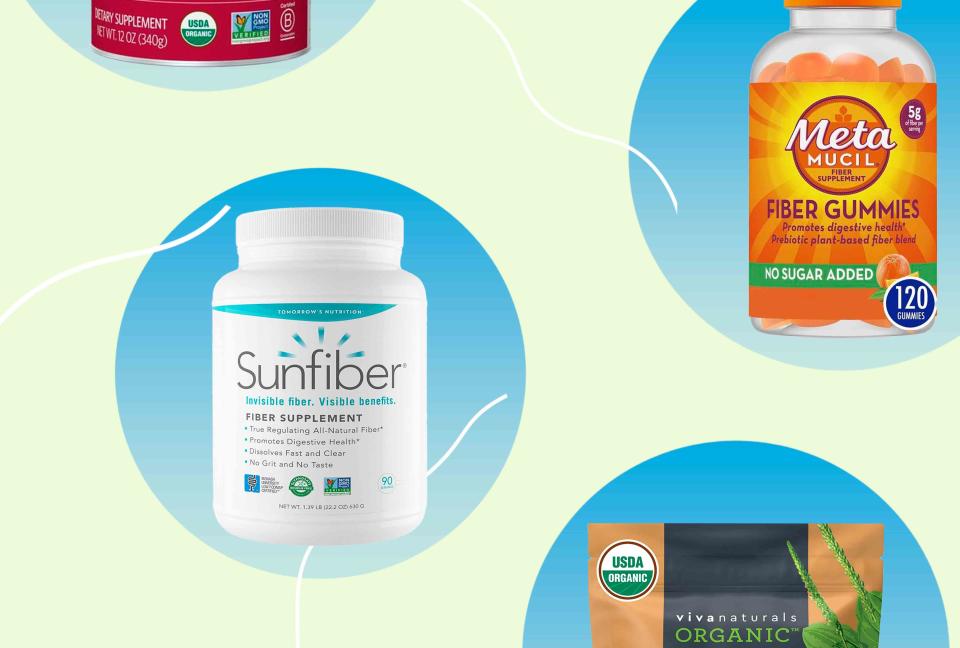
EatingWell / Madison Woiten
Reviewed by Dietitian Brierley Horton, M.S., RD
Fiber is a powerful nutrient—it can help bolster your gut and heart health and even help manage your weight and blood sugar levels. Yet only 5% of men and 9% of women get enough fiber on a daily basis, according to the American Society of Nutrition. The current U.S. dietary guidelines recommend consuming 14 grams of fiber for every 1,000 calories you eat. But if whole grains, legumes, fruits and vegetables aren't regulars on your plate, you're likely not meeting the daily recommendation. That's when a supplement can help.
There are a lot of fiber supplements to choose from, though. To bring you these recommendations, we researched a variety of fiber supplements—from the most common and popular to the most rigorously tested. Then, we spoke to registered dietitians about the criteria for selecting a quality supplement as well as asked for their top recommendations.
Our Top Fiber Supplement Recommendations
Best Overall: Viva Naturals Organic Psyllium Husk Powder
Also Great: Organic India Whole Husk Psyllium Powder
Best Value: NOW Psyllium Husk Powder
Best Gummy: Metamucil Fiber Gummies
Best for Kids: Sunfiber
Best for Travel: Regular Girl On-The-Go Packets
Related: EatingWell's Supplement Philosophy & Methodology
What Is Fiber?
Dietary fiber is a type of carbohydrate that passes through the gastrointestinal tract undigested. That means the body doesn't break down fiber into simple sugars as it does other types of carbs (starches and sugars). Fiber is found in plant-based foods, and there are two different types of fiber:
Soluble Fiber: Soluble fiber is dissolvable in water and turns into a gel in your GI tract, slowing digestion and helping to reduce cholesterol. It's found in beans, lentils, peas, oats and oat bran, apples, barley, citrus fruits, chia seeds and some other fruits and vegetables, say dietitians Tammy Lakatos Shames, RDN, CDN, and Lyssie Lakatos, RDN, CDN, aka the Nutrition Twins, and authors of The Nutrition Twins' Veggie Cure.
Insoluble Fiber: Insoluble fiber softens stools, acting as roughage. It doesn't ferment in the gut and, instead, helps move food through, which helps prevent constipation. Insoluble fiber is found in vegetables, whole grains and wheat bran, say the Nutrition Twins.
What Is Prebiotic Fiber?
All prebiotics are fiber, and many are soluble fiber. But not all fibers are prebiotic. Prebiotic fibers are fermentable, which feeds the good bacteria in our gut and also helps improve digestion. Some of the best sources of prebiotic fiber are asparagus, dandelion greens, onions, sunchokes (also known as Jerusalem artichokes), leeks and garlic, say the Nutrition Twins.
Best Overall: Viva Naturals Organic Psyllium Husk Powder
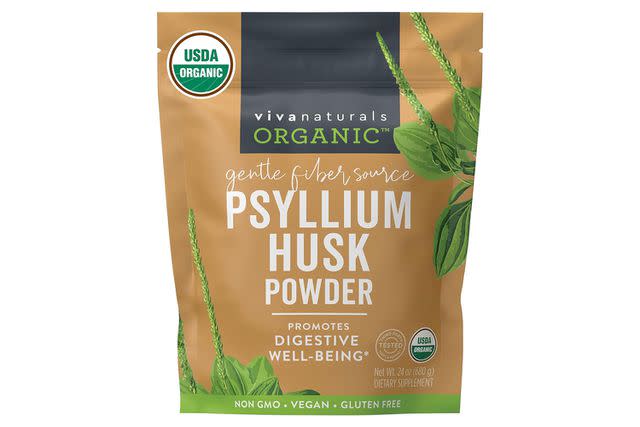
Amazon
What we like: It's third-party tested, organic and made with a research-backed form of fiber that has proven health benefits.
What to know: This product is made in a facility that also processes peanuts, tree nuts, milk and soy, so this product may not be OK if you have an allergy to any of these foods.
Viva Naturals is a reputable brand and Organic Psyllium Husk Powder contains a research-backed form of fiber. Psyllium powder is made up of mostly soluble fiber with a bit of insoluble fiber, and it's been shown to help relieve both constipation and diarrhea, help treat IBS and aid with weight loss by increasing satiety; it's also been shown to improve blood sugar and cholesterol levels.
Each teaspoon provides 4 g of fiber, and you'll want to start with just one teaspoon a day to get your body acclimated to the extra fiber. Viva Naturals is certified organic, non-GMO, gluten-free and packaged in the U.S. Each batch is third-party tested for quality and purity. "The texture of this fiber is soft and smooth, so you can stir it into water or shakes and mix it into the batter of baked goods," the Nutrition Twins say. Plus, it’s easily accessible on Amazon, and if you aren’t satisfied, we love their refund policy—you can return it, no questions asked.
Form: Powder | Type: Psyllium | Fiber per serving: 4 g per teaspoon | Third-party tested: Yes
Also Great: Organic India Whole Husk Psyllium Powder
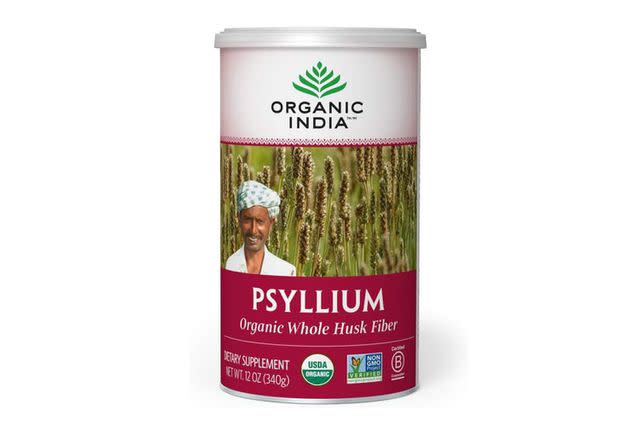
Amazon
What we like: It's organic, Fairtrade-certified and third-party tested, and psyllium is a well-studied form of fiber that's linked with many health benefits.
What to know: It gets gelatinous quickly, so you'll want to drink it right away after mixing it into water.
This single-ingredient psyllium powder is a great pick if you're looking to reap all the benefits of fiber, such as better digestion, constipation relief and improved cholesterol levels. Every batch of this organic psyllium is tested for purity, including for heavy metals, and in accordance with standards from the American Herbal Products Association (AHPA). "We also appreciate that Organic India is a Fairtrade-certified company and was named among the top 5% of B Corps for Community in 2022 for meeting the highest standards of social and environmental performance, public transparency and accountability," the Nutrition Twins say.
There’s nothing added, no sugar, no additives—it's just psyllium. Each serving contains 4 g of fiber, and you can add it to homemade baked goods and smoothies, or you can just mix it into water and drink it on its own. If you're mixing it with a liquid, make sure to sip it right away because it gets gelatinous fast.
Form: Powder | Type: Psyllium | Fiber per serving: 4 g per tablespoon | Third-party tested: Yes
Best Value: NOW Psyllium Husk Powder
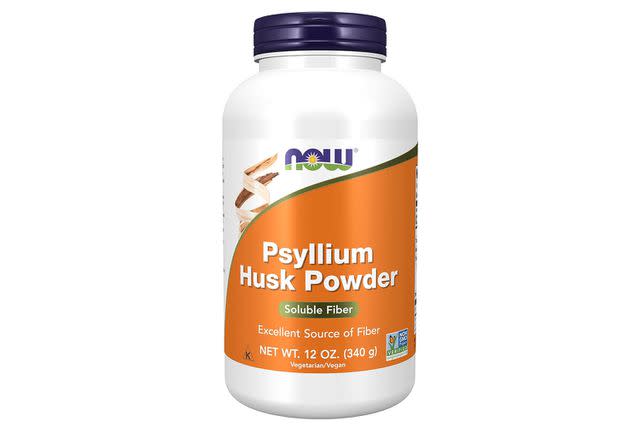
Amazon
What we like: This brand undergoes rigorous lab testing, and psyllium fiber is well-studied for providing a multitude of health benefits.
What to know: One serving contains 7 g of fiber, so you may want to start with half a serving per day until your body gets used to the extra fiber.
Another psyllium fiber, this pick from NOW is budget-friendly, coming in at about 30 cents per serving. Still, it doesn't skip on quality. NOW has one of the most comprehensive testing labs of any supplement manufacturer. "It’s cGMP certified [which means it's produced in an FDA-approved facility], and their manufacturing process is also third-party certified by Intertek, which is globally recognized," the Nutrition Twins say. "NOW conducts more than 19,000 tests per month from raw ingredients to finished products to ensure identity and purity of tested ingredients."
Each tablespoon of this powder packs 7 g of fiber, so you'll want to begin by taking half to one serving a day when you're just starting out. Consuming too much fiber right off the bat, when your body isn't used to it, can lead to cramping and gastrointestinal distress, so make sure to start slow. To take, mix this fiber powder with at least 12 ounces of liquid and consume immediately, because like with other psyllium powders, this gets gelatinous (and therefore harder to drink) fast.
Form: Powder | Type: Psyllium | Fiber per serving: 7 g per tablespoon | Third-party tested: Yes
Best Gummy: Metamucil Fiber Gummies
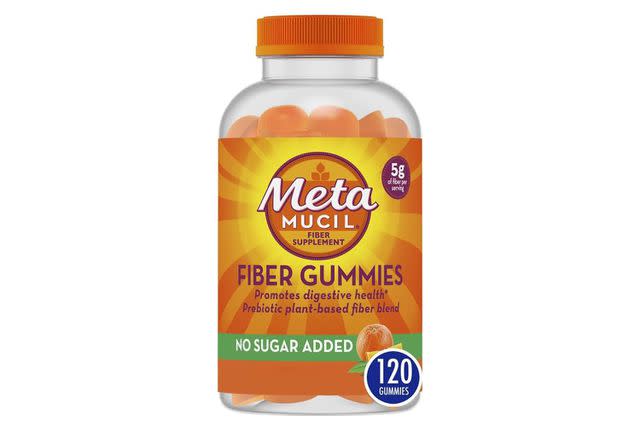
Amazon
What we like: These gummies don't contain any added sugar and provide a respectable 5 g of fiber per serving.
What to know: It contains a form of fiber (inulin and Fibersol) that isn't associated with as wide a range of health benefits as psyllium.
If you can't get behind the idea of drinking a fiber-filled liquid every day, try going the gummy route. Metamucil's Fiber Gummies are sugar-free—a major plus, since most gummy supplements can contain upwards of 5 g of sugar per serving. They're sweetened with the sugar alcohol xylitol and contain two types of prebiotic soluble fibers: inulin and Fibersol.
Unlike psyllium, inulin isn't viscous and does not form into a gel in the body, which also means that it doesn't offer health benefits such as lower cholesterol and better blood sugar control. But most fiber gummy supplements are made with inulin, and we couldn't find any psyllium fiber gummies on the market. Still, inulin is shown to increase good bacteria in the gut, helping bolster gastrointestinal health, according to a 2022 review published in the journal Nutrients. And while many fiber gummies contain fructooligosaccharides (FOS) as their main source of fiber, we like that Metamucil's product is made with Fibersol, which has been shown to cause less gastrointestinal discomfort than FOS.
One serving of three gummies has 5 g of fiber and the orange flavor makes these super easy to take.
Form: Gummy | Type: Inulin and Fibersol | Fiber per serving: 5 g per three gummies | Third-party tested: No
Best for Kids: Sunfiber
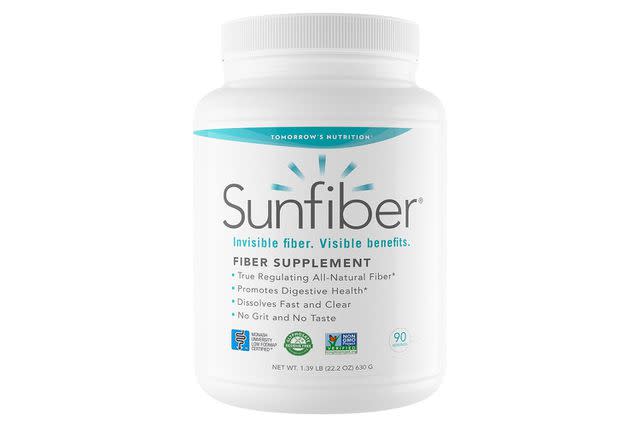
Amazon
What we like: Unlike other fiber powders, Sunfiber is tasteless and dissolves easily, making it easy to sneak into applesauce or oatmeal; plus, it's organic and third-party tested.
What to know: You may have to start with half the suggested serving to get your child's digestive system used to the extra fiber.
Sunfiber dissolves quickly into applesauce, yogurt, cereal, milk or water without affecting the texture or flavor of foods, which means even picky eaters likely won't notice the extra fiber in their snack or breakfast.
"Sunfiber is a prebiotic fiber that ferments slowly, which is ideal to prevent gas and bloating that often occurs from other fibers, and also produces short-chain fatty acids that offer many health benefits," the Nutrition Twins say. The type of fiber in this supplement is shown to help lower high blood sugar and high cholesterol, promote satiety, and even help relieve diarrhea, per a 2019 study in Nutrients.
Sunfiber is ideal for kids because zero chemicals, preservatives or additives are used or added during any of its growth or production. It’s organic and Detox Project certified, which means it doesn't contain harmful additives and chemicals that may be in other fiber supplements. It’s also Clean Label Certified and Tru-ID Certified, meeting strict criteria of showing what’s in its products and clearly and accurately identifying the prebiotic strains, the Nutrition Twins say. Each serving of Sunfiber has 6 g of fiber, which is appropriate for kids ages above 9 months—but it's still best to check with your child's pediatrician before adding a new supplement to their routine.
Form: Powder | Type: Sunfiber guar fiber | Fiber per serving: 6 g per scoop | Third-party tested: Yes
Best for Travel: Regular Girl On-The-Go Packets
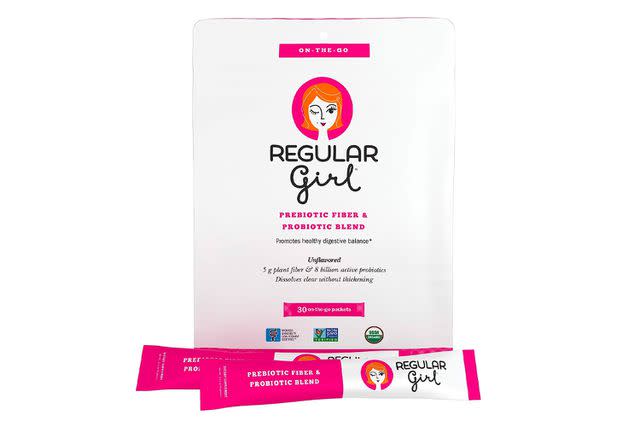
Amazon
What we like: These come in portable stick packets that dissolve easily in water, and they're low-FODMAP and third-party tested for purity.
What to know: You might have to start by taking half a stick until your body gets used to the extra fiber and probiotics.
Traveling can mess with your bowel habits and throw you off your routine, making it even harder to hit that daily fiber goal. These on-the-go packs from Regular Girl are recommended by the Nutrition Twins because they're easy to travel with and are packed with two gut-supportive nutrients that can help keep you regular wherever you are. "They contain prebiotics as well as probiotics to keep the gut nourished," the Nutrition Twins say.
These travel packs are organic, gluten-free, low-FODMAP and Glyphosate Residue-Free certified, as well as Non-GMO Project Verified, vegetarian and kosher. They're also third-party tested by Informed Choice, so they're free of potentially harmful banned substances. What's more, this fiber is flavorless and doesn't contain additives.
Each portable stick contains 5 g of soluble fiber from Sunfiber guar fiber, which dissolves quickly and easily in water. The Nutrition Twins recommend these packets in their practice: "We can attest that these help to keep our clients regular when they travel," they say.
Form: Powder | Type: Sunfiber guar fiber | Fiber per serving: 5 g per packet | Third-party tested: Yes
The Bottom Line: The Best Fiber Supplement
We deemed Viva Naturals Organic Psyllium Husk Powder (on Amazon) the best fiber supplement because it's third-party tested for purity and made with organic psyllium, which is a research-backed form of fiber with proven health benefits. Organic India Whole Husk Psyllium Powder (on Amazon) is another great option, as it's also third-party tested and contains psyllium. Looking to get your fiber in gummy form? We think Metamucil’s Fiber Gummies (on Amazon) make an ideal choice, although they aren’t third-party tested.
Choosing a Fiber Supplement
Look at Form and Fiber Source
When it comes to the different forms of supplements, the first thing to pay attention to is the amount of fiber per serving, the Nutrition Twins say. "Typically, powders contain more fiber than gummies or capsules, so you have to take a lot of capsules or gummies to equal the amount of fiber in a powder. For example, you’d have to take eight psyllium capsules to get the same amount of fiber (3.4 g) in a teaspoon of psyllium husk." Powders also come with the benefit that they can be added to drinks, which makes them easier to take than swallowing several pills. "Gummies often come with sugar and other additives, although all forms [including powders] may contain sugars or additives as well," the Nutrition Twins say.
The source of fiber in supplements can vary as much as the form. Some contain fiber from natural plant sources, like oat fiber, oat bran fiber, psyllium husk, flaxseed, inulin (chicory root) or corn fiber, while some can come from synthetic fiber sources or very processed plant sources, such as methylcellulose and guar gum.
No matter its source, if fiber is listed on the nutrition label, it's both safe and effective. "Fibers aren’t allowed to be listed on the food label as Dietary Fiber by the FDA if they haven’t demonstrated at least one beneficial effect on human health. This means they have been shown to either lower blood sugar, lower cholesterol, lower blood pressure, increase bowel movements, increase mineral absorption in the intestinal tract or reduce energy intake," the Nutrition Twins say.
Check the Ingredients
Supplements often contain additives and added sugars (especially gummies). Depending on your dietary preferences and health goals, always check the ingredient lists before buying a supplement. Some may be formulated with gluten or made in a facility that processes gluten, so if you have celiac disease or gluten sensitivity, make sure to double-check the label to ensure your supplement is gluten-free. The same goes for any other foods you may be allergic to.
Fiber supplements can also contain good-for-you added ingredients, such as probiotics, which may confer gut health benefits of their own.
Seek Out Third-Party Testing
Remember that, unlike with medications, the FDA doesn't review and approve supplements before they go to market. That's why it's important to choose one that's third-party tested for purity and potency. Many organizations, such as Informed Choice, test supplements—and most of our choices on this list were made based on certifications for the purist and quality standards.
Our Search for the Best Fiber Supplement
We researched many popular brands of fiber supplements, consulting with registered dietitians for their recommendations and criteria for selecting a high-quality supplement. The products on our list all come recommended by dietitians, and most of our choices are tested for purity and potency by reputable third parties.
Common Questions
What are the benefits of taking fiber supplements?
"It's best to get fiber from nutrient-dense whole foods because supplements don't have the vitamins, minerals and other nutrients that fiber-rich foods do. But fiber supplements can be part of your fiber intake and may be helpful, particularly if you don’t get enough," the Nutrition Twins say. Fiber supplements can help you meet your daily recommendations and can give you the benefits of fiber, such as helping with constipation and regulating your bowels, supporting heart health, helping improve cholesterol, aiding weight loss and more.
Will a fiber supplement help me lose weight?
Soluble fiber makes you feel full for longer by fermenting in the stomach and then slowing down the rate at which your stomach empties. "It helps with satiety by activating the GLP-1 receptors—the same way that popular weight loss drugs like Ozempic do," the Nutrition Twins say. Soluble fiber also helps stabilize blood sugar, so you don’t get energy highs and crashes, and it also helps prevent sugar cravings and overeating due to energy dips that make you crave more quick energy (aka sugar).
"Insoluble fiber is also great for weight loss because it helps to fill you up, and the calories in the fiber don’t get absorbed since they aren’t digested," the Nutrition Twins say.
How much fiber do I need?
The current dietary guidelines recommend getting 14 g of fiber for every 1,000 calories you eat per day. So, that works out to about 25 g of fiber each day for women and 38 g per day for men.
Eating foods high in fiber can help you meet these recommendations. According to the USDA, some of the best sources of fiber include:
Beans (9-19 g fiber per cup cooked, depending on the type of bean)
Lentils (16 g fiber per cup)
Chia seeds (10 g fiber per 2 tablespoons)
Acorn squash (9 g fiber per cup cooked)
Peas (9 g fiber per cup cooked)
Collard greens (8 g fiber per cup cooked)
Avocado (13 g fiber per avocado)
Broccoli (5 g fiber per cup cooked)
Whole-wheat pasta (5 g fiber per cup)
Can I take a fiber supplement if I have a history of GI issues?
"People with GI issues like Crohn's disease, IBS or a history of a blocked bowel should always talk with their doctor or registered dietitian before taking fiber supplements," the Nutrition Twins say. "If you are given the go-ahead to use fiber supplements, it’s important to monitor symptoms and always start with a small amount to prevent too much gas as the body adjusts to consuming more fiber."
It’s also important to drink plenty of fluids when you're adding more fiber to your diet. "Since fiber supplements can sometimes cause bloating, gas, diarrhea or abdominal pain that is often seen in people with IBS, symptom monitoring is important to ensure the fibers are not making symptoms worse," the Nutrition Twins say.
When should I take a fiber supplement?
What time of day you should take your fiber supplement depends on your goals. If you want to kickstart your digestive system for the day, taking your fiber supplement with breakfast can help with regularity and satiety. Alternatively, taking your fiber supplement with dinner can help you meet your daily fiber intake goals and aid your digestion throughout the night. Ultimately, consistency is key; by choosing a time that makes you more likely to remember to take your fiber supplement in the first place, you'll be better able to maximize its benefits.
Our Trusted Expertise
April Benshosan has been reporting on nutrition, health and expert-recommended products from the start of her journalism career. For this article, she interviewed two registered dietitians for their insights on fiber supplements: Tammy Lakatos Shames, RDN, CDN, and Lyssie Lakatos, RDN, CDN, aka the Nutrition Twins.
This article was edited and reviewed by Brierley Horton, M.S., RD, senior commerce editor, who has 15 years of experience reporting, writing and editing nutrition and health content.
Read the original article on Eating Well.

